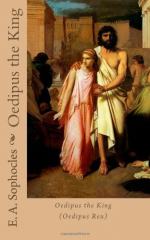|
This section contains 337 words (approx. 2 pages at 300 words per page) |
Themes in Oedipus Rex
Dramatic irony is shown when Oedipus confronts the blind prophet, Teiresias, who knows Oedipus' true destiny. Through his wisdom, Teiresias challenges him and declares that Oedipus "live[s] in hideous shame with those most dear to [him]... [and] cannot see the evil" (321). Because Teiresias hints at the truth without giving it entirely away, Oedipus remains unsighted to the truth. Mischievously, Teiresias implies that Oedipus should be shameful for his acts because he is symbolically blind to his wrongs. As Oedipus continues to mock him, the prophet decides to specify his prophecy and prove that Oedipus is "blind... [and] cannot see the wretchedness of [his] life" (322). Teiresias states that Oedipus, with both of his fully functioning eyes, cannot see the truth that lies in front of him. Despite his attempts to escape his inevitable destiny, he has landed himself the fate he was destined to have. At the end of the tragedy when Oedipus finds out everything he looks into the sky to praise the "light [and] look upon [it] for the last time" (354). The physical light of knowledge is replaced by mental knowledge that cannot be seen with the eyes. Through his physical blindness once he gouges out his eyes, he finally sees the truth.
In the tragedy of Oedipus Rex written by Sophocles it is ironic how the blind man is a `seer' and Oedipus who possesses sight is blind to things occurring in his life. Teiresias hints at the truth to Oedipus, but he remains completely oblivious to what is reality and his inevitable destiny.
|
This section contains 337 words (approx. 2 pages at 300 words per page) |


